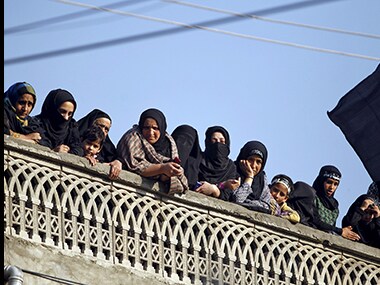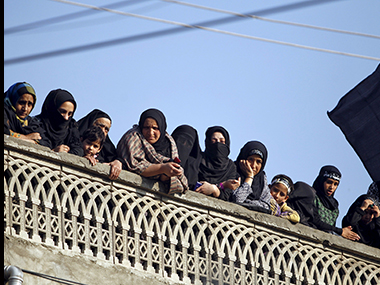A movement, led predominantly by Islamic clerics and some Muslim politicians, is underway among Indian Muslims to defend any likelihood of change or reform in Muslim Personal Laws. On 7 October, the Indian government filed an affidavit before the Supreme Court arguing that religious practices like triple talaq, polygamy and halala should be struck down in favour of Muslim women’s fundamental rights available under the constitution. Aided by Urdu newspapers published from various cities, Muslim organisations like the Darul Uloom Deoband, the All India Muslim Personal Law Board (AIMPLB) and the Jamiat Ulema-e-Hind are leading a movement in support of triple talaq, polygamy and other such anti-equality practices. At Deoband in Uttar Pradesh, Maulana Mufti Abul Qasim Nomani of the Darul Uloom Deoband seminary, issued a statement on 8 October saying: “Triple talaq and polygamy are an essential part of the Muslim Personal Law. Any type of change is impossible” – according to a front-page five-column report in Delhi-based Urdu daily Roznama Jadid Khabar of 9 October. Zafaryab Jilani, a member of AIMPLB, told a crowd of Muslims at Muzaffarnagar in Uttar Pradesh that 90 percent Muslim women support the Shariah-based laws, according to Hyderabad-based Roznama Etemaad of October 12. As per the report, Jilani “warned that Muslims will not accept interference in their personal law at any cost”. On 8 October, in the town of Dhule in Maharashtra, a signature movement was launched by a number of Islamic clerics associated with Jamiat Ulema-e-Hind and the AIMPLB to oppose the demand for triple talaq. These clerics and community leaders included Mufti Syed Muhammad Qasim Jilani, Abdul Ahad Asadi, Haji Asif Iqbal, Master Alamgir Khan and others. On 9 October, a similar signature campaign by women was organised at Ballia in Uttar Pradesh, opposing any change in Shariah. As per a report in Patna-based Urdu daily Roznama Qaumi Tanzeem of 10 October, more than two hundred Muslim women turned out at the Jamia Taiba madrassa in Ballia where they declared: “We Muslim women will abide by the laws of god and will not allow any unpious government effort for change in them to materialise.” [caption id=“attachment_3039924” align=“alignleft” width=“380”]  Representational image. Reuters[/caption] According to Roznama Jadid Khabar of 9 October, Maulana Khalid Rashid Firangi Mahali, the imam of Lucknow Eidgah, said: “Triple Talaq is a clear order of Shariah in which there is no possibility of change or reform… We will defend the Islamic Shariah fully.” Maulana Badruddin Ajmal Qasmi, an MP and president of the All India United Democratic Front, defended the triple talaq and polygamy saying: “The government’s stand militates against the constitutional rights of Muslims… On the pretext of women’s rights, there should be no interference in the Shariah laws of Muslims because Muslims will not accept it” – as per Roznama Jadid Khabar of 9 October. In Pratapgarh, UP, Maulana Shabbir Ahmed Muzahri, a leader of Jamiat Ulema-e-Hind, defended triple talaq and polygamy, adding: “Due to prejudice (against Muslims), the government is trying to trample upon the constitutional rights of Muslims by implementing Uniform Civil Code with regard to the marriage and divorce…,” according to an interview published in Delhi-based Urdu daily Roznama Sahafat of 10 October . It is extremely rare to find a report in the Urdu media which advocates abolition of triple talaq and polygamy. Perhaps a lone such report was published by Ranchi-based Urdu daily Qaumi Tanzeem of 8 October. As per the report, former minister Arif Muhammad Khan welcomed the government move to end triple talaq. Khan stated: “In the Quran, there is no space for oral triple talaq.” Of all the Urdu newspapers that support triple talaq, the Mumbai-based Urdu Times is at the forefront of the Islamic clerics’ movement against any reform in Islamic Shariah. When the government filed its affidavit opposing the religious practices that curb women’s constitutional rights, it ran a six-column banner report on 8 October. A subheadline described the move as a “conspiracy for interference in Shariah”. The next day, on 9 October, it published a five-column banner report whose headline declared: “No compromise on Shariah”. The statement was attributed to Maulana Syed Muhammad Wali Rahmani, general secretary of AIMPLB. The 9 October report also quoted Maulana Syed Arshad Madani, the president of Jamiat Ulema-e-Hind, as saying that the government’s stand is unacceptable. Madani declared: “The Quran and Hadiths (traditions of Prophet Muhammad) are the biggest constitution. In religious matters, only Shariah is worth emulating in which no change is possible till the Day of Judgement; and no change can be made in the Shariah in the name of social reforms.” The same day, the Urdu Times also carried on its front-page a four-column commentary by Qamar Sayeed Ahmad. It was headlined: The Moment of Trial – for Muslim Women. The author asked the government “not to waste its time” and added: “Muslim women possess lots given by Islam.” On 9 October itself, the Urdu Times published two reports over half a page opposing the move against triple talaq and associated issues. One report was titled: Triple Talaq – why is the government anxious? Farooq Ansari, the report’s author, declared: “Perhaps the government does not grasp it that to save the Muslim Personal Law, Muslims will not care for their life.” The second report was titled: “Interference in Shariah – the government affidavit, a garbage of deceit.” Arguing that the Rashtriya Swayamsevak Sangh (RSS) is behind the move for a Uniform Civil Code, it noted that even during the Muslim rule in India, there was no interference in their personal laws. “The British ruled for 150 years. They changed the personal laws of other religions but did not meddle with Islamic laws,” it added. The Urdu Times of 9 October also quoted Arif Naseem Khan, vice president of the Congress in Maharashtra, as saying: “A Muslim can sacrifice everything; when the matter comes up against the religion and Shariah, he will not accept it in any condition.” Another report also quoted Abu Asim Azmi, the Samajwadi Party leader in Maharashtra, as saying: “The Muslim will not tolerate interference in the Shariah; and he is ready to sacrifice his life for it.” Shamsher Pathan, a former assistant police commissioner, was quoted as saying: “It has been said in the affidavit that equal rights be granted to Muslim men and women with regard to divorce, which is against the Shariah.” According to Roznama Etemaad of 11 October, Maulana Asrar-ul-Haq Qasmi – a member of parliament (should we think how such clerics get into India’s parliament?) – declared that the government has “no right” to effect change in the personal laws since the rules regarding marriage and divorce have been settled by the Shariah. A protest was organised in Hyderabad on 10 October in defence of Shariah laws such as triple talaq where several clerics including Maulana Khalid Saifullah Rahmani spoke. According to an interview published in Roznama Sahafat of 10 October, Rahmani described the government move to end polygamy and triple talaq as “a conspiracy to deprive minorities of their rights.” While the above review of the Urdu newspapers is limited, it is fair to conclude that the Urdu and Islamic media across India publish similar content. A few critical points that emerge from this review include: One, the Urdu media does not see even minor space for change in Shariah and does not publish anything in favour of Muslim women’s freedom and individual rights. Two, the Muslim community’s leadership remains predominantly in the hands of Islamic clerics. A few non-clerics who are leaders also adopt the position of Islamic clerics. Three, no Urdu newspaper editor sent journalists to colleges and universities to talk to Muslim girls to find out what they want about their life. In almost all reports, the Urdu newspapers publish articles by male writers or statements of male politicians and clerics. Four, Urdu editors fail to grasp the fine distinction between the interests of Islam and the interests of Muslims, especially women. Urdu media does not evaluate ideas critically, except when it wants to criticise the right-wing Hindu leaders. In the Golden Age of Islam, Muslims translated and read Aristotle and Plato, a point Urdu editors need to ponder over. Five, Urdu newspapers are also conspicuous by the absence of statements from the so-called secular tribe of Hindu journalists, award-winning authors and politicians because obviously they are silent on the issue of Muslim women’s rights. People’s progress is a function of new ideas and one doesn’t get the sense that any Urdu newspaper is debating anything that can be described as new, reasoned and rational. The author is a former BBC journalist and a contributing editor at Firstpost, and executive director of the Open Source Institute, New Delhi. He tweets @tufailelif Click here to read Shishir Tripathi’s interview with Arif Mohammad Khan titled Triple talaq negates both equality and dignity of Muslim women: Arif Mohammad Khan
A movement, led predominantly by Islamic clerics and some Muslim politicians, is underway among Indian Muslims to defend any likelihood of change or reform in Muslim Personal Laws.
Advertisement
End of Article


)

)
)
)
)
)
)
)
)



